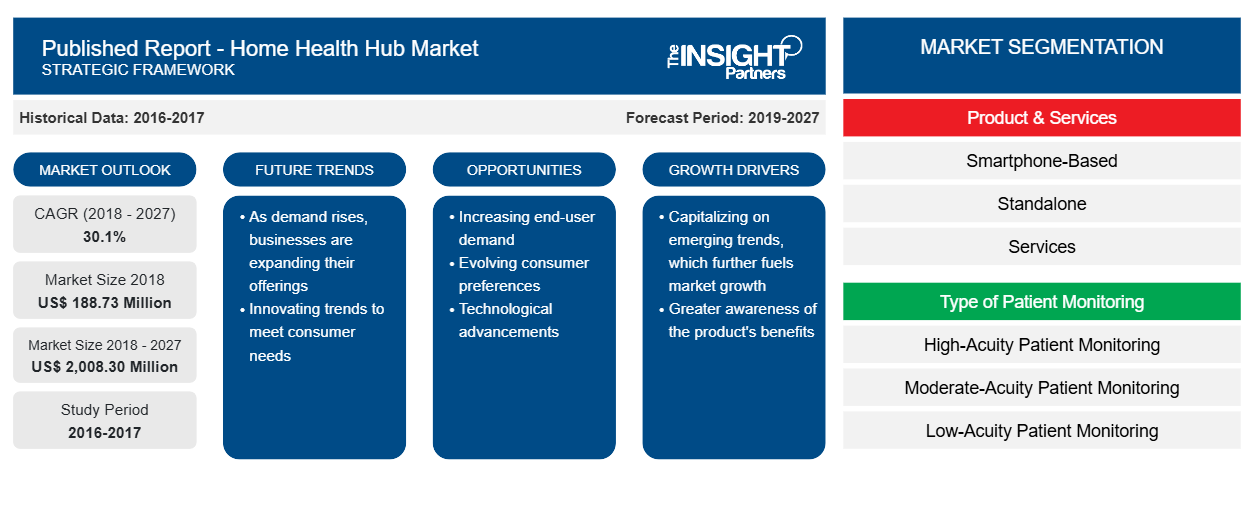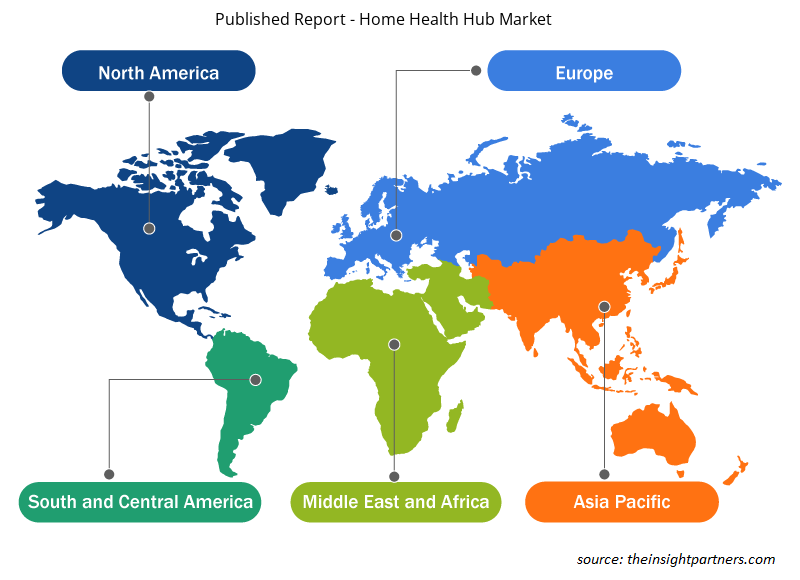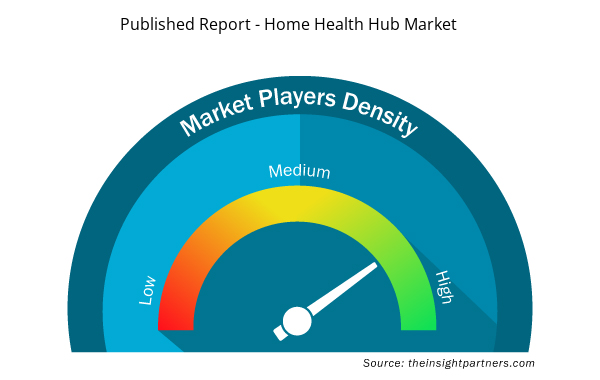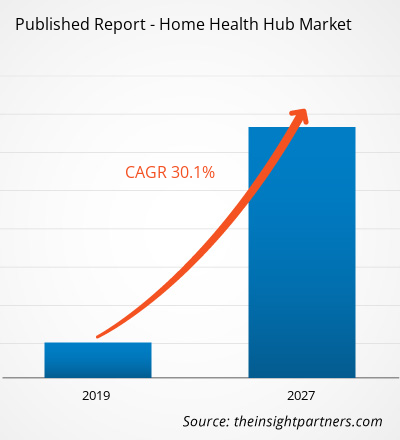The Home Health Hubs in healthcare market was valued at US$ 188.73 million in 2018 and it is projected to reach US$ 2,008.30 million by 2027; it is expected to grow at a CAGR of 30.1% from 2019 to 2027.
Home health hub is a software platform that connects the health caregiver and patient through the patient's electronic devices and proactively organizes, cares & manages chronic diseases for better outcomes. Significant developments such as advanced connected home and mobile technologies are increasing efficiency and automation capabilities of data collection from patients. This helps to improve hospital and patient connectivity, thereby improving healthcare delivery and quality of care. The growth of the Home Health Hubs in healthcare market is attributed to the increasing demand for home monitoring devices and better health outcomes and reduced costs. However, the growth of market is likely to experience restrain due to cyber threat and rise in data security.
The Home Health Hubs in healthcare market is expected to witness substantial growth post-pandemic. The COVID-19 has affected economies and industries in various countries due to lockdowns, travel bans, and business shutdowns. The COVID-19 crisis has overburdened public health systems in many countries and highlighted the strong need for sustainable investment in health systems. As the COVID-19 pandemic progresses, the healthcare industry is expected to see a drop in growth. The life sciences segment thrives due to increased demand for invitro diagnostic products and rising research and development activities worldwide. However, the medical technologies and imaging segment is witnessing drop in sales due to a smaller number of surgeries being carried out and delayed or prolonged equipment procurement. Additionally, virtual consultations by healthcare professionals are expected to become the mainstream care delivery model post-pandemic. With telehealth transforming care delivery, digital health will continue to thrive in coming years. In addition, disrupted clinical trials and the subsequent delay in drug launches is also expected to pave the way for entirely virtual trials in the future. New technologies such as mRNA is expected to emerge and shift the pharmaceutical industry and market is also expected to witness more vertical integration and joint ventures in coming years.
Market Insights
Growing Applications of Home Health Hubs in Healthcare to Drive Home Health Hubs in Healthcare Market Growth
Customize This Report To Suit Your Requirement
You will get customization on any report - free of charge - including parts of this report, or country-level analysis, Excel Data pack, as well as avail great offers and discounts for start-ups & universities
Published Report - Home Health Hub Market: Strategic Insights

- Get Top Key Market Trends of this report.This FREE sample will include data analysis, ranging from market trends to estimates and forecasts.
Customize This Report To Suit Your Requirement
You will get customization on any report - free of charge - including parts of this report, or country-level analysis, Excel Data pack, as well as avail great offers and discounts for start-ups & universities
Published Report - Home Health Hub Market: Strategic Insights

- Get Top Key Market Trends of this report.This FREE sample will include data analysis, ranging from market trends to estimates and forecasts.
Home health hubs are a developing zone of the home health technology market, which is also known as home health gateways. The two major components included in home health hubs are standalone devices, and monitoring & maintenance services, which include mobile devices such as smartphone or tablet, and wearable devices such as smart watches. These devices and services use wireless technology to collect information from disparate sources from connected home medical monitoring equipment and standalone health and wellness devices. Home medical monitoring programs are intended to help patients with re-hospitalization or frequent emergency room (ER) visits to receive treatments at home. The aim of home health hub is to reduce hospital trips and length of stays in hospitals. A home health hub comprises a wide range of health data of a patient from the point of care that includes vital signs, weight, heart rates, blood sugar, blood oxygen levels, blood pressure, and electrocardiograms. The data can be transmitted to skilled health professionals in facilities such as hospitals and intensive care units, skilled nursing facilities, centralized off-site case management programs and monitoring centers. The patients monitored remotely by professionals are provided with a treatment plan based on the health data information. Many companies are focusing on developing innovative products. For instance, in January 2014, iHealth Lab Inc., launched three new wearable mobile personal health products—ambulatory blood pressure monitor (ABPM), wearable pulse oximeter, and wireless ambulatory electrocardiogram (ECG). Therefore, owing to the abovementioned factors, the demand for home health hubs is significantly increasing during the forecast period.
The healthcare industry increasingly becomes more advanced and digital through the increasing adoption of telehealth solutions & applications. Telehealth has the potential to aim the quality of care for improving the health of populations and also helps to reduce the per capita cost of care. Increasing investments in telehealth and telemedicine help to reduce the healthcare system costs. Moreover, these technologies enable to use of telecommunication techniques from health services research to bring about change in the health insurance and hospital industries. Self-care medical devices such as blood pressure and blood glucose monitoring kits, and telemetry monitoring for heart conditions, wearable devices also play a vital role in home healthcare. Moreover, ehealth and mhealth services also play a dynamic role in decreasing overall healthcare spending. For instance, remote analysis services and remote or mhealth technologies enable highly trained professionals to work as pooled resources and contribute to lower cost, in turn of higher quality care.
Moreover, the EU mHealth Hub Project is created to support the innovations and upsurge the usage of mobile health apps by assembling the stakeholders such as governments, start-up companies, young entrepreneurs, and technical officers. The program includes the development of more practice of smartphones to collect and share the operating mHealth projects to the other countries within national health systems. It is a collaboration between ITU and WHO, which was released on 7th August 2017. The project is funded by The European Commission Horizon-2020 2016-2017 Work Program. Thus, the mHealth and Telehealth is expected to play a dynamic role in decreasing overall healthcare spending that will likely to add novel opportunities for the home health hubs market in the forecast period.
Product & Services -Based Insights
In terms of product & services, the Home Health Hubs in healthcare market is segmented into smartphone based, standalone, and services. In 2018, the standalone hub segment held the largest share of the market. Moreover, smartphone-based hubs segment is expected to register the highest CAGR of 30.7% in the market during the forecast period.
Type of Patient Monitoring -Based Insights
Based on type of patient monitoring, the Home Health Hubs in healthcare market is segmented into high acuity patient monitoring, moderate acuity patient monitoring, low acuity patient monitoring. In 2018, the high-acuity patient monitoring segment held the largest share of the market. Moreover, moderate-acuity patient monitoring segment is expected to register the highest CAGR of 30.6% in the market during the forecast period.
End User-Based Insights
In terms of end user, the Home Health Hubs in healthcare market is segmented into hospitals, healthcare payers and home care agencies. In 2018, the hospital segment held the largest share of the market. Moreover, it is expected to register the highest CAGR of 30.5% in the market during the forecast period.
The Home Health Hubs in healthcare market players are adopting the product launch and expansion strategies to cater to changing customer demands worldwide, which also allows them to maintain their brand name globally.
Home Health Hub Published Report - Home Health Hub Market Regional Insights
Published Report - Home Health Hub Market Regional Insights
The regional trends and factors influencing the Published Report - Home Health Hub Market throughout the forecast period have been thoroughly explained by the analysts at Insight Partners. This section also discusses Published Report - Home Health Hub Market segments and geography across North America, Europe, Asia Pacific, Middle East and Africa, and South and Central America.

- Get the Regional Specific Data for Published Report - Home Health Hub Market
Published Report - Home Health Hub Market Report Scope
| Report Attribute | Details |
|---|---|
| Market size in 2018 | US$ 188.73 Million |
| Market Size by 2027 | US$ 2,008.30 Million |
| Global CAGR (2018 - 2027) | 30.1% |
| Historical Data | 2016-2017 |
| Forecast period | 2019-2027 |
| Segments Covered |
By Product & Services
|
| Regions and Countries Covered | North America
|
| Market leaders and key company profiles |
Published Report - Home Health Hub Market Players Density: Understanding Its Impact on Business Dynamics
The Published Report - Home Health Hub Market market is growing rapidly, driven by increasing end-user demand due to factors such as evolving consumer preferences, technological advancements, and greater awareness of the product's benefits. As demand rises, businesses are expanding their offerings, innovating to meet consumer needs, and capitalizing on emerging trends, which further fuels market growth.
Market players density refers to the distribution of firms or companies operating within a particular market or industry. It indicates how many competitors (market players) are present in a given market space relative to its size or total market value.
Major Companies operating in the Published Report - Home Health Hub Market are:
- OnKöl
- Insung Information Co, Ltd.
- Ideal Life Inc.
- iHealth Labs Inc.
- Honeywell International Inc.
Disclaimer: The companies listed above are not ranked in any particular order.

- Get the Published Report - Home Health Hub Market top key players overview
Home Health Hubs in Healthcare Market – by Product & Services
- Smartphone-Based
- Standalone
- Services
Home Health Hubs in Healthcare Market – by Type of Patient Monitoring
- High-Acuity Patient Monitoring,
- Moderate-Acuity Patient Monitoring
- Low-Acuity Patient Monitoring
Home Health Hubs in Healthcare Market – by End User
- Hospitals
- Healthcare Payers
- Home Care Agencies
Home Health Hubs in Healthcare Market – by Geography
North America
- US
- Canada
- Mexico
Europe
- France
- Germany
- Italy
- UK
- Spain
- Rest of Europe
Asia Pacific (APAC)
- China
- India
- South Korea
- Japan
- Australia
- Rest of APAC
Middle East & Africa (MEA)
- South Africa
- Saudi Arabia
- UAE
- Rest of MEA
South America and Central America (SCAM)
- Brazil
- Argentina
- Rest of SCAM
Company Profiles
- OnKöl, INSUNG INFORMATION CO,LTD.
- IDEAL LIFE INC.
- iHealth Labs Inc.
- Honeywell International Inc.
- Vivify Health, Inc.
- Capsule Technologies Inc. (QUALCOMM LIFE, INC.)
- MedM
- SENSATO CYBERSECURITY SOLUTIONS
- CISCO SYSTEMS, INC
- Historical Analysis (2 Years), Base Year, Forecast (7 Years) with CAGR
- PEST and SWOT Analysis
- Market Size Value / Volume - Global, Regional, Country
- Industry and Competitive Landscape
- Excel Dataset



Report Coverage
Revenue forecast, Company Analysis, Industry landscape, Growth factors, and Trends

Segment Covered
Product & Services ; Type of Patient Monitoring ; End User and Geography

Regional Scope
North America, Europe, Asia Pacific, Middle East & Africa, South & Central America

Country Scope
US, Canada, Mexico, UK, Germany, Spain, Italy, France, India, China, Japan, South Korea, Australia, UAE, Saudi Arabia, South Africa, Brazil, Argentina
Frequently Asked Questions
Prices of home health hub varies from USD 20 (small home hub that work with any connected health device such as blood pressure, weight scales, etc.) to USD 150.
The rising preference for home monitoring devices, increasing remotely monitored patients by professionals with a treatment plan based on the health data information is expected to propel the growth of the home health hubs market. Moreover, Better health outcomes by advanced home health hubs at reduced costs is anticipated to drive the global market.
Home health hubs are also called home health gateways is a software platform that connects the health caregiver and patient through the patient's electronic devices and proactively organizes, cares & manages chronic diseases for better outcomes. Significant developments such as advanced connected home and mobile technologies are increasing efficiency and automation capabilities of data collection from patients. This helps to improve hospital and patient connectivity, thereby improving healthcare delivery and quality of care.
Trends and growth analysis reports related to Life Sciences : READ MORE..
The List of Companies
- OnKöl
- Insung Information Co, Ltd.
- Ideal Life Inc.
- iHealth Labs Inc.
- Honeywell International Inc.
- Vivify Health, Inc.
- Capsule Technologies Inc. (Formally: QUALCOMM LIFE, INC.)
- MedM
- Sensato Cybersecurity Solutions
- Cisco Systems, Inc.

 Get Free Sample For
Get Free Sample For